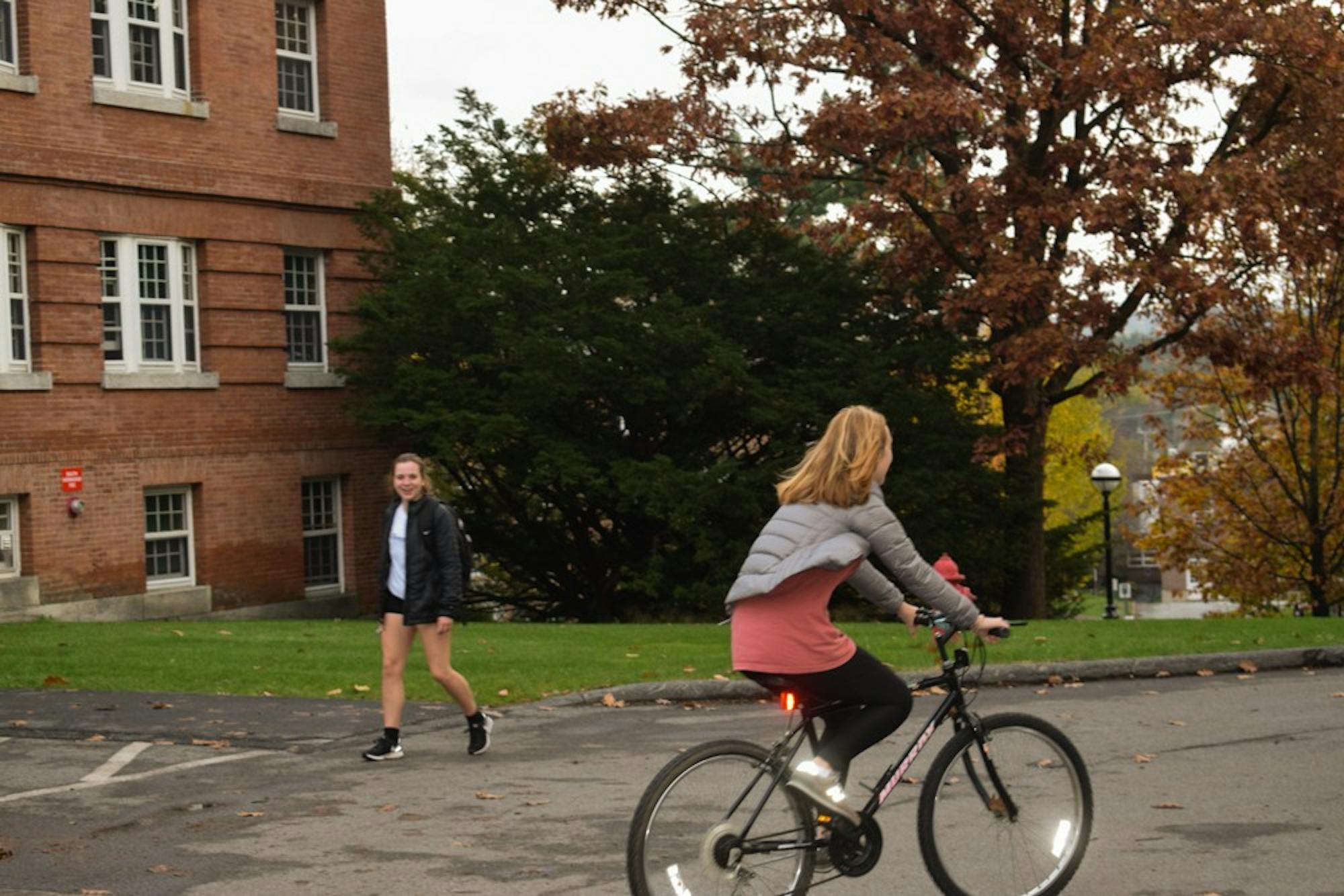Around fall of 2022, local officials began erecting signs around Dartmouth’s campus forbidding students from biking on sidewalks, according to Wendell Wu ’23, a member of the Dartmouth Bikes Shop and the Dartmouth Bike Walk Committee. Hanover Police officers have begun to enforce the law as well, stopping students and issuing warnings, Lieutenant Mike Schibuola said.
According to the Fordham Urban Law Journal, New Hampshire has been one of nine states to fully ban biking on sidewalks since 1975. Many students said they are growing upset with recently increased enforcement from the Hanover Police department, according to both Wu and Schibuola. Wu said the recent enforcement forces cyclists to endure unsafe conditions.
“Why are we forcing bicyclists to go into the road with armored vehicles [cars]?” Wu said. “There is not a single protected bike lane [in Hanover], even on the roads with the most traffic, like East Wheelock [Street].”
Carter Bartel ’27, a member of Dartmouth’s Cycling Team, agreed with Wu’s sentiment.
“[A lack of bike lanes] makes it pretty dangerous for bikers going from class to class, having to weave in and out of cars that are going and stopping and watching out for pedestrians,” he said.
According to previous reporting by The Dartmouth, police officers began enforcing the law following the death of Lucile Bailey, a 91-year-old Hanover resident who was struck by a bicyclist on a sidewalk in 2017. Since then, many Hanover residents have called upon the police department to take action against cyclists riding on sidewalks, according to Schibuola.
“Obviously, we’re always going to enforce traffic laws when we see safety violations,” Schibuola said. “However, we are now getting a lot of complaints about the downtown area.”
Schibuola added that Hanover Police seldom issues citations, but rather gives out verbal warnings. HPD’s goal, he said, is to keep people safe.
“The bottom line is it’s not about issuing citations,” Schibuola said. “In fact, we have only issued one citation … I would say 99 times out of 100 we're giving a warning to people just to educate them on what the laws are.”
Nevertheless, Wu and other cyclists remain frustrated with the situation. A poll from the Dartmouth Bikes Team found that around 58% of students felt that sidewalks should be open to wheeled use. Another 10% felt that the law should at least differentiate between campus areas where biking is allowed — such as paths on the Green and Kemeny Courtyard — and town sidewalks where cycling is not — like those along East Wheelock Street — to alleviate confusion.
According to Wu, the biggest concern from cyclists is the lack of bike lanes and other protected bike infrastructure in and around campus. Wu said that Bailey’s death occurred down a hill in an area without any bike lanes. A proposal was submitted in 2021 for bike lanes around the Green, but it was turned down for not being “shovel ready,” as the College believed there were significant barriers to construction, according to Wu.
“The issue lies in the lack of sufficient infrastructure, not in bikers on sidewalks,” he said. “Bikers face more danger from cars than pedestrians do from bikers.”
Bartel added that enforcement could discourage students from biking to class.
“I definitely think there should be bike lanes, especially since there is such a big bike culture on campus,” he said. “It should be encouraged for students to bike to class, not discouraged.”
Wu and other students continue to fight for changes. Because it is both a Hanover town ordinance and New Hampshire state law, Wu argued that the easiest course for the Town is to lower the fine to an insignificant amount. He also argued for the greater enforcement of speed limits, which directly impact the safety of cyclists.
“We are always thinking of ways we can improve the bike infrastructure in town, but it is always an uphill battle,” Wu said.
Schibuola stressed that HPD’s “door is always open” for those concerned about enforcement.
“Nobody likes getting stopped by the police, and we’re aware of that,” he said. “We want everybody to have a good time — whether [students] at Dartmouth College or visitors in Hanover — and … a safe time while they’re here. Unfortunately, sometimes we have to enforce the little things.”
Correction appended (March 31, 10:09 p.m.): A previous version of this article incorrectly stated that Lucile Bailey was hit after a cyclist went around a blind turn. However, she was struck at the bottom of a hill. The article has been updated.




